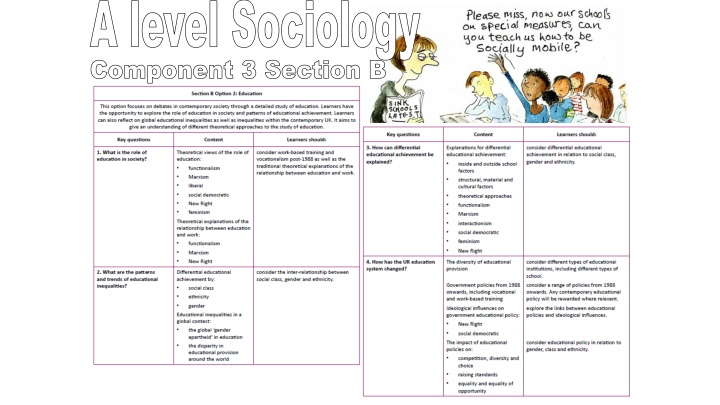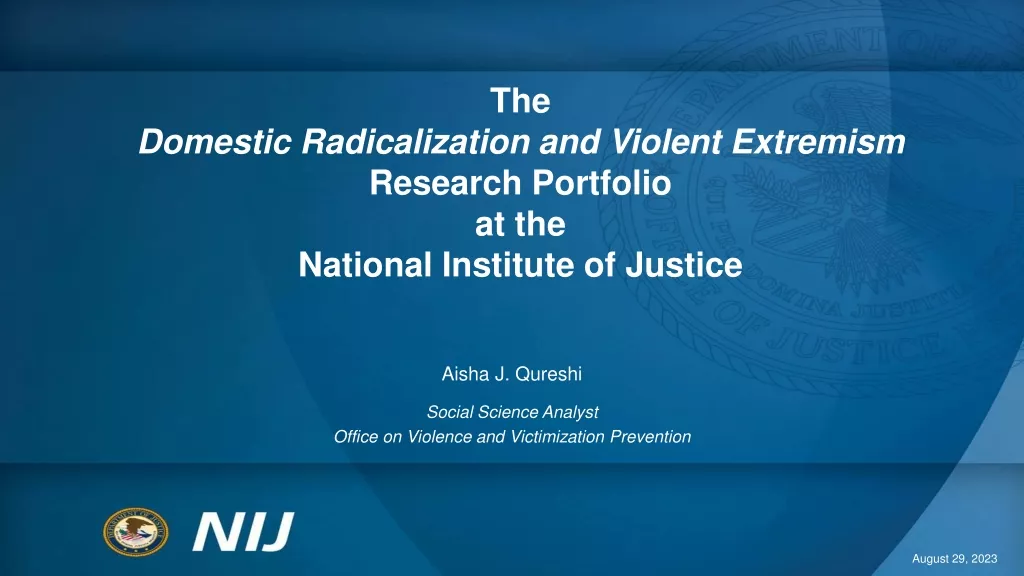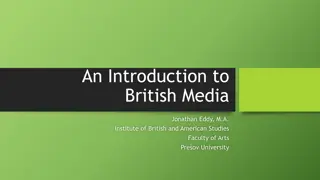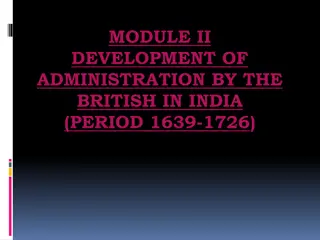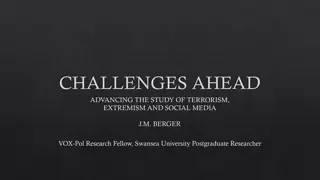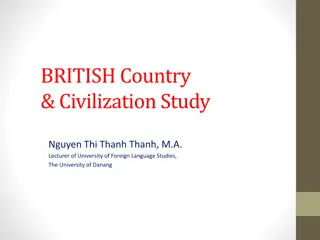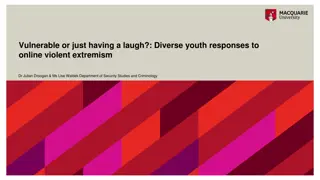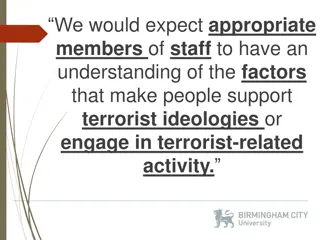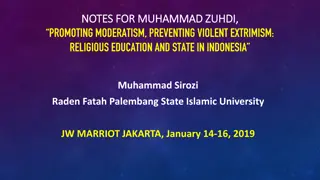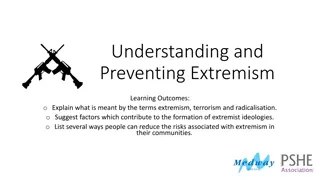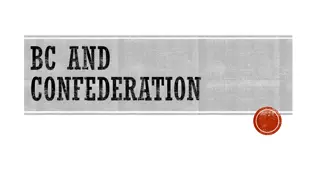Education Role: Promoting British Values & Preventing Extremism
A major overhaul of school inspections in England aims to promote British values and prevent extremism by challenging radical practices. Schools failing to meet the requirements may face closure or staff dismissal. The changes follow the Trojan Horse scandal, emphasizing the promotion of democracy, rule of law, individual liberty, mutual respect, and tolerance of different beliefs.
Download Presentation

Please find below an Image/Link to download the presentation.
The content on the website is provided AS IS for your information and personal use only. It may not be sold, licensed, or shared on other websites without obtaining consent from the author.If you encounter any issues during the download, it is possible that the publisher has removed the file from their server.
You are allowed to download the files provided on this website for personal or commercial use, subject to the condition that they are used lawfully. All files are the property of their respective owners.
The content on the website is provided AS IS for your information and personal use only. It may not be sold, licensed, or shared on other websites without obtaining consent from the author.
E N D
Presentation Transcript
A level Sociology Component 3 Section B
10 mark questions are marked with 6 marks for AO1 and 4 marks for AO2. 20 mark questions are marked with 8 marks for AO1, 4 marks for AO2 and 8 marks for AO3. 40 mark questions are marked with 16 marks for AO1, 8 marks for AO2 and 16 marks for AO3.
The Functionalist explanation of the Role of Education Read pages 99-100 of the textbook. Durkheim Parsons Davis and Moore
Schools face closure if they fail to promote British values Plans for a major overhaul of Ofsted inspections will see 20,000 schools in England required to challenge parents and teachers who express support for radical Islamic practices By Tim Ross, Political Correspondent 7:05AM BST 22 Jun 2014 Schools face being closed down by the government if they fail to promote British values such as ensuring children know the difference between right and wrong, under plans to prevent extremism in the classroom. A major overhaul of Ofsted inspections will see 20,000 schools in England required to step in to challenge parents, teachers or pupils who express support for radical Islamic practices and other beliefs contrary to the fundamental tenets of British sociIf inspectors find schools are failing to meet the new requirement, headteachers and governors could be sacked or in the worst cases the school could be closed. A consultation from the Department for Education will be launched this week, setting out the details of the new rules. The plan follows the emergence of the so-called Trojan Horse scandal, extensively detailed in a series of Telegraph investigations, in which hardline practices were found in schools in Birmingham. Six schools in the city were put in special measures after Ofsted inspectors found they had fallen into the hands of bullying governors who had sought to narrow the curriculum and exclude non-Muslim pupils. Inspectors described how raffles and tombolas at one primary school had been banned from a recent f te because they were considered un-Islamic as they promoted gambling. It was also disclosed that one academy's Christmas special assembly was cancelled and a termly assembly staged by a Christian charity had been scrapped. The terms white prostitute were used in assemblies. Under moves to prevent a repeat of these events, Michael Gove, the Education Secretary, has drawn up plans requiring schools to promote the British values of democracy, the rule of law, individual liberty, mutual respect and tolerance of those of different faiths and beliefs. Private schools, academies and free schools must already show that they respect these values but the wording of the rules is being strengthened to require them to actively promote British values in the classroom. The rules are also being extended to cover all local authority run state schools, through changes to Ofsted s operating framework later this year. A Department for Education spokesman said: Keeping our children safe and ensuring schools prepare them for life in modern Britain could not be more important. This change is an important step towards ensuring we have a strong legal basis for intervening in those schools where this is an issue. The vast majority of schools already promote British values this is about making sure we have the tools we need to intervene if children are being let down. The proposed definition of actively promoting the required values will include challenging pupils, staff or parents who expressing opinions that are contrary to fundamental British values. Action will also be taken against schools where girls are left at a disadvantage on the grounds of their gender, or where prejudice against people of other faiths is encouraged or not sufficiently challenged by staff. The new rules will also require schools to promote principles which enable students to distinguish right from wrong and to respect the civil and criminal law of England. Pupils must also be given broad knowledge of and respect for the country s public institutions and services, the proposals will say. From: http://www.telegraph.co.uk/education/educationnews/10917305/Schools-face-closure-if-they-fail-to-promote-British-values.html
Do you think that schools should promote British values ? Explain your point If schools were required to promote British values , which values should be included? Explain your points.
Evaluating the Functionalist explanation of the Role of Education Read through each of the criticisms of the functionalist view. Note next to each which theory would make each criticism Evaluation of functionalist views Functionalists assume that students will passively respond to the education system. They don t recognise that students may develop different ideas from those taught. = Functionalist writers argue that education transmits a common set of values, but does contemporary society share a common set of values? Some sociologists these values are imposed on people in a form of brain washing which suits powerful groups. = As modern societies have become more complex many sociologists recognise an increasing diversity of values, rather than shared values. An example is that ethnic diversity has brought with it a range of values in relation to gender, religion and the family. = There is evidence that the education system isn t meritocratic there are vast differences in attainment between class, gender and ethnic groups. Critics argue that the education system selects and allocates on the basis of background rather than ability. = The values and skills passed on through the education system don t benefit society as a whole, but favour the rich and powerful. The emphasis on conformity in education encourages people to be passive and accept authority in later life. The emphasis on skills for employment provides the capitalist class with workers who will maximise their profits. =
Homework: The functions of education (activity page 100-101 textbook) Q1 Q3
The role and function of education i.e. What is education for? The Marxist view of education: Key thinkers = Althusser (French philosopher, 1970s) Bowles and Gintis (American sociologists, 1970s) Paul Willis (British sociologist 1970s NEO-MARXIST) Pierre Bourdieu (French sociologist 1970s) In brief the function of education (according to Marxists) is: To serve the needs and interests of the ruling class The hidden curriculum is used to cement expectations and aspirations of the proletariat and the bourgeoisie in order to maintain inequality and privilege.
Althusser (1971) Education as an ideological state apparatus (ISA) (also see p. 101 in text book) Althusser doesn t think that education transmits common values; he argues that it is an ideological state apparatus with the function of maintaining, legitimising and reproducing, generation by generation, class inequalities in wealth and power. This is done by transmitting the values of the ruling class capitalist values disguised at common values. This allows capitalism to flourish without needing to use force. Althusser says this is done through the hidden curriculum working class students are encouraged to conform to the capitalist system and accept failure and inequality uncritically. Think of 5 examples of how the hidden curriculum in schools encourage conformity to capitalist system: Bourdieu (1977) Symbolic violence Bourdieu argues that working class cultural attributes are rejected as the education system is defined by and for middle classes, who have more cultural capital. He calls the means by which the working classes are duped into accepting their failure and limited social mobility as justified symbolic violence. Think of examples what middle class attributes might be valued by the education system.
Bowles and Gintis (1976) Correspondence theory (also see p. 102 in text book) Bowles and Gintis argue that education reproduces directly the capitalist relations of production. There is a hierarch with the boss at the top and the workers at the bottom and both systems have shared skills and attitudes. Education means that workers will unquestioningly adapt to the needs of the system. Correspondence theory suggests that what goes on at school corresponds directly to the world of work. Teachers are like the bosses and students are like the workers, who work for rewards. The higher up the system the individual progresses, the more personal freedom they have to control their own educational or working experiences and the more responsibility they have for the outcomes. Bowles and Gintis point out that success is not totally related to intellectual ability. Students who fit in and conform rise above those who challenge the system. Use page 102 of the textbook to make notes on the different ways that schools correspond to the workplace.
Paul Willis Learning to Labour (page 103-104) 1. Record his conclusions in just 5 bullet points. 2. How does Willis work support the work of the other Marxist theorists 3. How does Willis work challenge the work of other Marxist theorists 4. What are the weaknesses of Willis study.
Evaluating Marxist view Briefly summarise the criticisms of the Marxist views on the role of education. Discuss: Consider the weight of evidence. How convincing do you find the Marxist views on the role of education?
Working class children must learn to be middle class to get on in life, government advisor says Lack of cultural experiences such as visits to restaurants and theatres and the way they dress are holding working class children back, says Social Mobility and Child Poverty Commission policy chief By Georgia Graham, Political Correspondent 6:00AM GMT 03 Mar 2014 Working class children must be taught to think and act like the middle classes if they are to get into the best universities and top professions, a Government adviser has said. Peter Brant, head of policy at the Social Mobility and Child Poverty Commission, said that children from poor homes need help to change the way they eat, dress and conduct personal relationships to get ahead in life. In a post on the commission s blog he said that bright children are less likely to apply to top universities because they are worried about "not fitting in". He said that they need to become more comfortable with middle-class social setting such as restaurants, theatres and offices if they are to succeed. Last year Sir John Major, the former head of the Conservative Party, warned that it was "truly shocking" that that private school educated and affluent middle-class children still run Britain. Michael Gove, the Education Secretary, has said that state schools must set their standards "so-high" that they become indistinguishable from the best fee paying schools. However, Mr Brandt said that middle-class politicians are placing too much focus on education, and often fail to realise the need to make poorer children feel "comfortable" in middle class settings. He said: "It seems likely that worries about "not fitting in" will be one reason why highly able children from less well-off backgrounds are less likely to apply to the most selective universities. "It probably contributes to a lack of confidence amongst those who are upwardly mobile as they struggle to adapt to their new social environment with detrimental impact on their ability to reach their potential. "And the lack of effective networks and advice to help navigate this new alien "middle class world" probably make it more difficult to translate high attainment into success in the professional jobs market." Mr Brant suggested that visiting different places, watching plays and having varied hobbies can help give working class children "shared cultural experiences" with those from middle-class backgrounds. He said that young people from working class backgrounds have less "nuance and casualness" in their relationships with other people. They also wear different clothes, eat different food and visit different restaurants. He said that these factors should not be ignored because of the government's focus on GCSE results and educational attainment. "One helpful thing would be more awareness of this as a potential issue - it can often be unappreciated by policy makers who mostly come from middle-class professional backgrounds. "This often means that debate can all too easily assume that if educational inequalities can be reduced and aspirations of young people from working-class backgrounds raised then that alone will be enough to tackle the problem." Mr Brant who was raised in a 150,000 semi-detached house in Newport Pagnell, Milton Keynes went to Aylesbury Grammar School and then on to Cambridge University has worked in as a senior policy advisor for Nick Clegg and held similar policy roles at the Communities Department. He also served in the Prime Minister's strategy unit under Gordon Brown at the cabinet office that provided policy advice on key government policy priorities. He now works at the Social Mobility and Child Poverty Commission which is chaired by Alan Milburn, the former Labour Health Secretary. The body acts as an official adviser to the Coalition. Mr Brant said: "Tackling this issue is - of course - difficult and complicated and it is far from clear what an effective response to them would be. "One helpful thing would be more awareness of this as a potential issue - it can often be unappreciated by policy makers who mostly come from middle-class professional backgrounds. "This often means that debate can all too easily assume that if educational inequalities can be reduced and aspirations of young people from working-class backgrounds raised then that alone will be enough to tackle the problem."Another helpful thing would be developing a better understanding of what is necessary to help tackle these barriers. From: http://www.telegraph.co.uk/education/10671048/Working-class-children-must-learn-to-be-middle- class-to-get-on-in-life-government-advisor-says.html
HW: Globalisation and privatisation of education (pages 104-105) Q1 Q2 Q3 Q4 FOR AGAINST
Similarities and differences between the Functionalist and Marxist explanations of the role and function of education.
To what extent is education meritocratic. [20] In what ways does education contribute to socialisation in society? [10] 3 x points + counter points 3 paragraphs, each explaining a distinct way that education contributes to society Conclusion Point + study + explanation in relation to the question. Each point should be a PEE (Point + study + explanation) It should then be evaluated with a direct challenge to the point you have just made (just like you did in your inequality section) NO EVALUATION REQUIRED Do this 3 times. Write a conclusion that sums up how far the evidence is supported or not. You must make a decision and justify your point.
Question 4: Question 5:
Question 6: Outline and evaluate the view that education reproduces inequalities in society. [40] 4 x points + counter points Conclusion Each point should be a PEE (Point + study + explanation) It should then be evaluated with a direct challenge to the point you have just made . Would challenge .. s argument that They argue that .. This weakens . Point because . (just like you did in your inequality section) Write a conclusion that sums up how far the evidence is supported or not. You must make a decision and justify your point. This is just the same structure as your other 40 marker.
In what ways does education contribute to socialisation in society? [10]
Social Democratic Approaches In some ways, the approach of social democrats to education is similar to the approach of functionalists. Social democrats see education as an opportunity to provide equality of opportunity necessary to create a meritocratic society, where the most important positions are filled by the most talented people, regardless of their class, gender, ethnicity etc. They also agree that as societies become more complex education needs to develop to make sure that the next generation has the skills, knowledge and aptitudes needed to create economic growth and increase wealth. o However, social democrats believe that inequalities in society prevent this kind of meritocratic society becoming a reality. If poverty prevents a student from having the same chances as a student from a more privileged background it is not possible to create a meritocracy. o Social democrats believe that the government should take measures to bring about greater equality of opportunity. They think that governments should spend money on education so that students develop the knowledge and skills needed for economic growth. This was a particularly significant view in the 1960s. Social democrats differ from Marxists because they believe that it is possible to work within capitalism to create a fairer system and that democratic governments can work in the interests of those who elect them, rather than the capitalist class.
Halsey Grammar school system disadvantaged working class children Halsey argued that the 11+ exam tested middle-class culture and falsely labelled working class children as less intelligent. This label was believed by the working class and acted on. Social democrats believed in the abolition of the tripartite system and its replacement by the comprehensive system, where everyone would receive the same opportunities and children of differ classes would mix. Crossland Fairer education leads to social mobility Tony Crossland - a well known Labour Party politician wrote in his book The Future of Education that a fairer education system would also equalise the distribution of rewards and privileges - social mobility would increase which would mean that class distinctions would become blurred. Shulz Skills and knowledge as forms of capital The social democratic perspective saw that prosperity would be brought to all by allowing everybody to develop their potential and make the maximum contribution to society. Theodore Shulz (1961)in the USA argued that skills and knowledge were forms of capital. The belief was that if you invest more in your workforce then efficiency and productivity would increase. Evidence in the USA was seen in the fact that farms with educated workforces outperformed those farms that the workers were uneducated. This was the principle applied to the UK from 1944 with increased spending on education to produce a more skilled workforce.
Social Democratic Approaches In what ways is the education system meritocratic? In what ways is the education system not meritocratic?
Evaluation of social democratic approach: (also see p. 105-106 in text book) Read through and record the criticisms of the social democratic explanation of the role and function of education.
Debates about education and the economy. Read the activity on page 106-107 Work in pairs to complete all of the questions. You need to write your responses in such a way that you can revise from this material in future.
To what extent would functionalists and Marxists agree with the social democratic approach to education? Agree Disagree Functionalists Marxists
LO: All will know the main functions of schools, according to the New Right. Most will evaluate these views. Some will use sociological studies to explore these ideas. New Right Approaches There are two elements to the New Right sometimes they have contradictory views. Neo-liberals believe that individuals are rational and should be allowed to make their own decisions about their own futures. Neo-conservatives believe that people need guidance and their choices need to be limited. Margaret Thatcher * was strongly influenced by neo-liberal thought. * Hissssssssssssssssssssssssss
The New Right agrees with functionalist approaches to education in some ways. They argue that some people are naturally more able than others and that education should create a meritocratic social order where the best will prosper. They also agree that the education system should help to create a united and integrated society by creating a common national culture and identity they see socialisation as a key role of education. o However, the New Right think that the current education is failing to achieve these goals and needs to be transformed. The New Right disagree with education being a state monopoly, regarding this as inefficient. They think that competition is needed to stimulate improvement and that the views of the consumer (parents, students, businesses) should be taken into account. They have criticised the running of education by a secret garden , with a few people controlling education and dominating decision making in their own interests. The New Right want to break down the walls of the secret garden and unleash the power of the market (marketisation), letting the consumer decide how education is organised and run. They want to give power to parents forming a parentocracy. The New Right are also concerned that education has moved too far in the direction of trying to create equality and that the focus should be on standards this was the motivation behind the 1988 Education Reform Act. This runs alongside the argument for marketisation if parents have the power to choose which school their child attends this will force schools to raise their standards and focus on raising attainment. Successful schools will grow; the less successful will have to improve, be shut or be taken over by the more successful. This also links to testing, as parents need information about the quality of schools. There is also an argument that many of the UK s economic problems stem from a narrow focus on academic education and knowledge for its own sake. Some from the New Right argue that schools should have a greater focus on work-based skills and less of a focus on aspects such as raising cultural awareness. However, neo-conservatives value the teaching of classic literature and British History.
Buchanan & Tullock Public choice theory The New Right have been influenced by J. Buchanan & C. Tullock (1962) with their public choice theories. They believe that bureaucracy and democracy are likely to produce inefficient and ineffective services with the producers dominating the decision-making process and not the consumers. Buchanan and Tullock see our education system as a monopoly where consumers cannot freely choose alternatives. They believe that education reflects the interests of teachers and the bureaucrats and that pupils and parents have little control over education. Chubb and Moe Introduction of market forces in education J. E. Chubb and T. M. Moe have proposed the full introduction of market forces in education to raise standards. They believe that in state education students, parents and citizens have a legitimate say in how that education system should be run. They believe that vested interests tend to undermine the autonomy of schools, restricting their ability to respond to the needs and wishes of parents. Chubb and Moe believe that state education is intended to serve wider public purposes as determined by politicians. Brown & Lauder - Global economy In a global economy, new technology and new knowledge are essential for economic success. The primary purpose of education is to develop these skills and instil this knowledge.
Criticisms of New Right Approaches (also see p. 107-108 in text book) Market-led approaches lead to greater inequalities. Middle class parents are more able to manipulate the system and use their cultural capital to get the best education for their children (Ball et al, 1994). This goes against the meritocratic dreams of the classless society. The idea that ability is a fixed and natural biological characteristic is questionable. It ignores the impact of material, cultural or educational processes. Over-subscribed schools may try to select the bests students to maintain their league table position, leaving others to attend less successful schools. In 2001 David Gillborn found that competition leads to marginalisation of working class and ethnic minority students. To get the best test results, teachers may end up teaching to the test and ignoring the broader education of students. Levin & Belfield (2006) analysed schools which have used greater marketization principles and found only modest improvements in student achievement but combined with greater social inequalities.
Criticisms of New Right Approaches Gerwitz et al Comprehensive values Market Values Led by agenda of social and educational concerns Ked by agenda of image / budgetary concerns Oriented to serving community needs Oriented to attracting mitivated parents / able children Emphasis on student need Emphasis on student performance Resource emphasis on less able / SEN Resource emphasis on more able Mixed ability Setting Integrationist Exclusive Caring ethos Academic ethos Emphaisis on good relationships as basisi of school discipline Emphasis on extrinsic indicators of discipline e.g. uniform Cooperation amongst schools Competition between schools
Task 1: Identify examples that suggest that the New Right approach has been implemented.
TASK 2: Look at the activity on pages 108-109 in the text book The debate over free schools In what ways does the introduction of free schools fit in with the New Right approach to education? What arguments in favour of free schools are put forward by Toby Young in item B? What criticisms are made of New Right approaches to education by Stephen Ball in Item C?
TASK 2: Look at the activity on pages 108-109 in the text book The debate over free schools Using the information from the items and your knowledge. Explain how free schools can be a positive additions to the English education system. Using the information from the items and your knowledge. Explain how free schools can be a negative addition to the English education system.
Homework: Outline and evaluate the view that marketisation improves educational provision. [20] (20 mark questions are marked with 8 marks for AO1, 4 marks for AO2 and 8 marks for AO3.)
Feminist Approaches Spender - Invisible women In the 1980s Dale Spender described women as invisible in education, with the curriculum being male-biased and limited attention being paid to the role of women in history, sciences or the arts. Spender also found that boys received more attention and encouragement from teachers. Hidden curriculum Feminists argue that the hidden curriculum reinforces gender inequalities, with males and females not only studying different subjects in the formal curriculum, but also receiving hidden messages in the way schools are organised. An example is that females may dominate more subordinate roles such as cleaning and catering. Gender socialisation Whilst Marxists argue that education is concerned with social reproduction, perpetuating class inequalities, many feminists see schools acting as agencies of gender socialisation, reproducing relationships of dominations and subordination between males and females.
Feminist Approaches Evaluation of feminist approaches (also see p. 110 in text book) Feminism and social change have led to major changes in education in the last 30 years. Girls now study the same subjects as boys and teaching materials don t feature sexist images. Schools have equal opportunities policies and teachers are trained to have the same expectations of boys and girls. Some commentators argue that feminism is no longer relevant. Some argue that it is now boys that are underachieving and are being disadvantaged by a feminised education system. Marxists argue that feminists focus too much on gender issues when social class differences are far more of an issue. Evidence of girls and boys being treated differently in schools Evidence of girls and boys not being treated differently in schools
Read the article below, highlight evidence that women and men still have different experiences in education in the UK. How well are women represented in UK science? After Nobel prize-winning biochemist Tim Hunt quit his UCL position over remarks about girls , we look at what statistics say about women in laboratories George Arnett Saturday 13 June 2015 Nobel laureate Tim Hunt resigned from his position at University College London (UCL) after remarking on his trouble with girls in laboratories. At the World Conference of Science Journalists in Seoul, South Korea, Hunt said: Let me tell you about my trouble with girls Three things happen when they are in the lab You fall in love with them, they fall in love with you and when you criticise them, they cry. While some commentators have welcomed Hunt s resignation, it does not cover over the issue that women are still underrepresented across almost every level of science. In science, technology, engineering and maths (Stem) jobs According to the Women in Science and Engineering (Wise) campaign s latest analysis of UK labour market statistics, women make up just 12.8% of the Stem workforce. The proportion had increased by only 0.2 percentage points since their analysis in 2012. This has caused some concern for the UK government. In July 2012, the then business secretary, Vince Cable, said: There s no way we can generate the number of scientists and engineers the economy requires without addressing the situation. In university departments and enrolments A science and technology select committee report on women in scientific careers last year contained the following statistic: Women are under- represented at professorial levels across academic research careers in all Stem disciplines (typically 17% although there is variation between disciplines). The proportion of boys studying science subjects is still considerably higher than the proportion of girls. The latest Higher Education and Skills Agency (HESA) statistics showed that in 2013-14 52% of male undergraduates were enrolled on a science course compared to 40% of females. The gap increases when you get to postgraduate level, with 46% of male students on a science course compared with 34% of female ones. In the classroom In 2014 there were more male than female participants in all major A-level Stem subjects with the exception of biology, according to the Joint Council for Qualifications. For the physics examination, 78.9% of those sitting the exam were boys. The proportion of those sitting it that were female decreased between 2013 and 2014 despite it increasing (albeit modestly) in all of the other core Stem subjects. A recent OECD study found that girls lacked confidence in science and maths, even when their results were as good or better than boys . In programme for international student assessment (Pisa) scores, UK girls perform worse in science than boys, with the gap being much bigger than in other countries. From: http://www.theguardian.com/news/datablog/2015/jun/13/how-well-are-women-represented-in-uk-science
HW: Do one of the tasks below. Record your findings. Be ready to present your findings to the class. 1. Find out how many males and females are employed in different roles in the school to see if females dominate in more subordinate roles. Observe a lesson and record each time the teacher interacts with girls and boys. Note the number of boys and girls in the class. Do boys receive more attention than girls (as Spender found in 1983)? Analyse textbooks from different subject areas to see if there are examples of sexism i.e. all scientists being presented as men. Interview history, art and/or science teachers to find out which men and women they teach about. Does this suggest the curriculum is balanced? Design a questionnaire and ask sixth formers to fill it out to explore their own experiences of gender and education. Find out how many males and females study different A level subjects. You could also find out which courses the last cohort of year 13 students are studying at University. Are males and females participating equally in STEM subjects? 2. 3. 4. 5. 6.
Liberal and Radical Approaches Ivan Illich Deschooling society There are four logical possibilities about any person in relation to any job. 1. The person has the skill and ability AND the credential. 2. The person has the skill and ability BUT NOT the credential. 3. The person does not have the skill and ability BUT DOES have the credential. 4. The person has NEITHER the skill and ability OR the credential. 4) 4 can be discounted: Illich has no more sympathy for this individual as a candidate for social rewards than does the credentialing system. Many students, especially those who are poor, intuitively know what the schools do for them. They school them to confuse process and substance. Once these become blurred, a new logic is assumed: the more treatment there is, the better are the results; or, escalation leads to success. The pupil is thereby "schooled" to confuse teaching with learning, grade advancement with education, a diploma with competence, and fluency with the ability to say something new. His imagination is "schooled" to accept service in place of value. Medical treatment is mistaken for health care, social work for the improvement of community life, police protection for safety, military poise for national security, the rat race for productive work. Health, learning, dignity, independence, and creative endeavour are defined as little more than the performance of the institutions which claim to serve these ends, and their improvement is made to depend on allocating more resources to the management of hospitals, schools, and other agencies in question. 1) It is often assumed that those in position 1; i.e. those with credentials ARE skilled also. Illich thinks there is a huge degree of evidence that indicates that this isn t the case. In other words Illich argued that: society itself has suffered since we have substituted "process" for "substance" in our quest for objective and fair standards of measurement and in wishing to make up for genuine differences in achievement. I.e. too much emphasis is placed on accreditation for a skill (etc) rather than the learning of that skill. Illich presumesthat there is a general belief that society will indeed get the best people via the certification process. Illich believes this is not only false, but has other negative consequences besides the belief's falseness. 2) Despite being skilled and talented people in position 2 are very often excluded from the work place by social custom and even by law. Illich focuses on both the terrible injustice to deny the individual his or her talents, and at the same time brings our attention to the great social loss by denying society the benefit of the genuine talents and skills. 3) Case 3 is another case which interests Illich - that credentials often do not tell us much about what we can expect in skill or knowledge.
Liberal and Radical Approaches Ivan Illich Deschooling society Read pg 111-112 Explain what Illich suggests education should be like. Read activity on page 112. Summerhill School - What are the advantages and disadvantages of this approach to education?
The link between education and the economy Stick your mindmap here
The link between education and the economy Functionalists think that the education system needed to emerge when the UK became industrialised (society changed from being agricultural to one dominated by large-scale industry) because society became more mobile. Education would create a skilled workforce and create a meritocratic social order. According to Davis and Moore (1945), school is the place where people s ability is tested and graded. This means that employers can use qualifications to sort school leavers into jobs that suit their level of ability. Marxists think that as capitalist economies grew, capitalists needed a mechanism to control the working class. Having seen revolutions spread through Europe, they were anxious that the revolutionary fervour could spread to the new working classes living in poverty in the industrial cities. Education was seen as a way to deflect the working class from radicalisation, controlling people rather than encouraging individual freedom. The New Right see education as important in supporting economic growth. They call for a greater emphasis on vocational education, for example courses which directly train students in skills they can use in the workplace.
The link between education and the economy Functionalism Parsons Selects and allocates occupational position. Durkheim Creates a skilled workforce. Davis and Moore Allocates people to the right positions. Marxism Bowles and Gintis Creates a subservient workforce. Bourdieu Creates illusion of equality to enable happy workers
The link between education and the economy Read through pages 117-118 of the handout. Draw up a timeline of initiatives in vocational education. For each: Name, detail, what it s trying to achieve, party that introduced it. HW: Research into what has been done in terms of vocational educational education since 2010. Add these to your timeline.
The link between education and the economy Read through pages 118-120 Describe the response of each theory to New Vocationalism.
Education and the economy revision: Fill the gaps in the paragraphs below, using the words provided at the bottom of the slide From a .......................point of view the link between education and the economy is a ......................... and a clear one. For instance directly after World War Two when there was a shortage of .......................... in Britain the school leaving age was only 15 because young peoples' labour power was needed to rebuild the ................................. Later as economic circumstances and pressures changed the school leaving age was raised to 16 and new .................... were introduced as new skills were needed in the economy. New ...................... from a functionalist perspective can be seen as an example of this process. However from a Marxist perspective the link between education and the ............................ is less positive. The education system is seen to mirror the conflicts and divisions of .............................. society. As part of the superstructure schools therefore organise themselves to ......................... class divisions. Students are streamed and selected on class lines and the purpose of education for the majority is to create a compliant, ....................... and docile working class. New Vocationalism can be seen from a Marxist perspective as an example of this process capitalist economy economy functionalist labour obedient perpetuate positive qualifications Vocationalism
Education and the economy: Vocational Education - REVISION New Vocationalism : How closely should education and the economy be linked? The issue of whether education is providing the right types of skills for the economy has come under scrutiny from sociologists New Vocationalism is an example of a social policy designed to establish close links between education and the economy New Vocationalism has been criticised by Marxist sociologists
